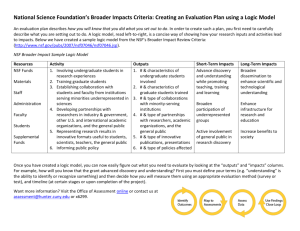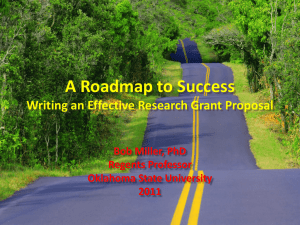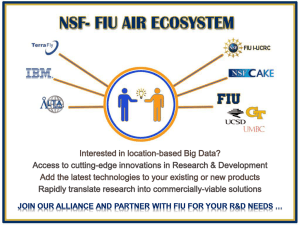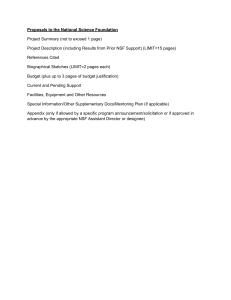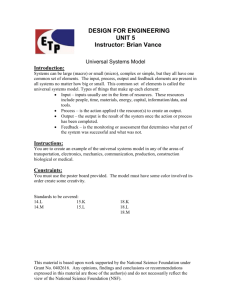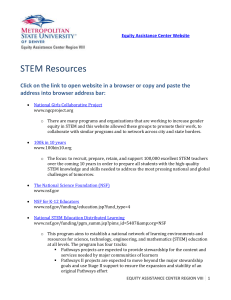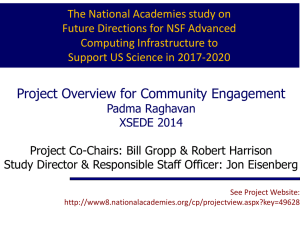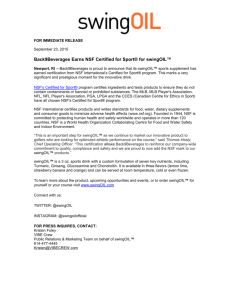Sponsor
advertisement
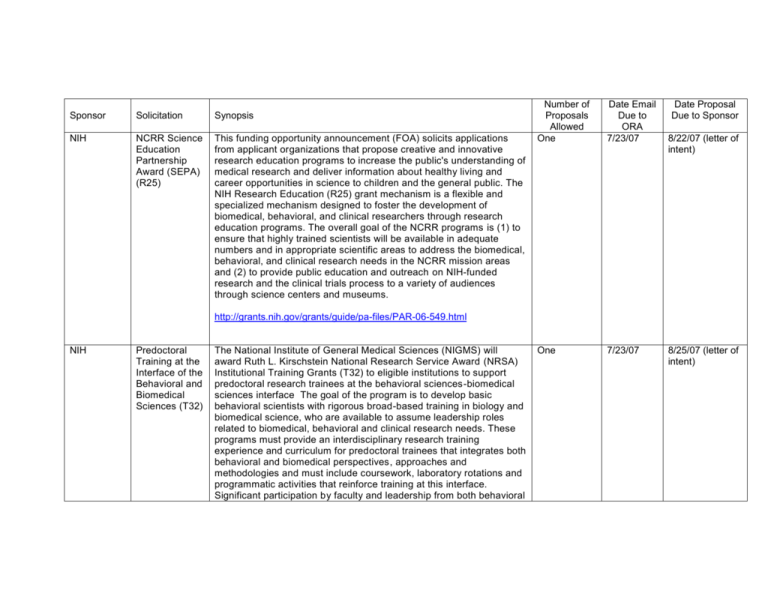
Sponsor Solicitation Synopsis NIH NCRR Science Education Partnership Award (SEPA) (R25) This funding opportunity announcement (FOA) solicits applications from applicant organizations that propose creative and innovative research education programs to increase the public's understanding of medical research and deliver information about healthy living and career opportunities in science to children and the general public. The NIH Research Education (R25) grant mechanism is a flexible and specialized mechanism designed to foster the development of biomedical, behavioral, and clinical researchers through research education programs. The overall goal of the NCRR programs is (1) to ensure that highly trained scientists will be available in adequate numbers and in appropriate scientific areas to address the biomedical, behavioral, and clinical research needs in the NCRR mission areas and (2) to provide public education and outreach on NIH-funded research and the clinical trials process to a variety of audiences through science centers and museums. Number of Proposals Allowed One Date Email Due to ORA 7/23/07 One 7/23/07 Date Proposal Due to Sponsor 8/22/07 (letter of intent) http://grants.nih.gov/grants/guide/pa-files/PAR-06-549.html NIH Predoctoral Training at the Interface of the Behavioral and Biomedical Sciences (T32) The National Institute of General Medical Sciences (NIGMS) will award Ruth L. Kirschstein National Research Service Award (NRSA) Institutional Training Grants (T32) to eligible institutions to support predoctoral research trainees at the behavioral sciences-biomedical sciences interface The goal of the program is to develop basic behavioral scientists with rigorous broad-based training in biology and biomedical science, who are available to assume leadership roles related to biomedical, behavioral and clinical research needs. These programs must provide an interdisciplinary research training experience and curriculum for predoctoral trainees that integrates both behavioral and biomedical perspectives, approaches and methodologies and must include coursework, laboratory rotations and programmatic activities that reinforce training at this interface. Significant participation by faculty and leadership from both behavioral 8/25/07 (letter of intent) and biomedical science departments is required, as is co-mentoring of trainees by faculty from both components http://grants.nih.gov/grants/guide/pa-files/PAR-06-503.html NSF Informal Science Education (ISE) The ISE program invests in projects that develop and implement informal learning experiences designed to increase interest, engagement, and understanding of science, technology, engineering, and mathematics (STEM) by individuals of all ages and backgrounds, as well as projects that advance knowledge and practice of informal science education. Projects may target either public audiences or professionals whose work directly affects informal STEM learning. ISE projects are expected to demonstrate strategic impact, innovation, and collaboration. Three 7/23/07 9/13/07 (Preliminary proposal) 1/14/08 3/13/08 (Preliminary proposal) 7/23/07 9/15/07 11/15/07 1/15/08 3/18/08 5/15/08 8/27/07 9/28/07 http://www.nsf.gov/publications/pub_summ.jsp?ods_key=nsf06520 Theodore Edson Parker Foundation Theodore Edson Parker Foundation The Parker Foundation's primary goal is to make effective grants that benefit the city of Lowell and its residents. Grants are made for a variety of purposes including social services, cultural programs, community development activities, education, community health needs, and urban environmental projects. One http://www.grantsmanagement.com/parkerfoundation.html Searle Searle Scholars Program Funds are given to support research in medicine, chemistry and the biological sciences. Grants are made to selected academic institutions to support the independent research of outstanding individuals who are in the first or second year of their first appointment at the assistant professor level, and whose current appointment is a tenure-track position http://www.searlescholars.net/pgm_history/index.html One from UMass President’s Office Arnold and Mabel Beckman Foundation Beckman Young Investigators Program The Arnold and Mabel Beckman Foundation makes grants to research institutions to promote research in chemistry and the life sciences, broadly interpreted, and particularly to foster the invention of methods, instruments and materials that will open up new avenues of research in science. The Beckman Young Investigator (BYI) Program is intended to provide research support to the most promising young faculty members in the early stages of academic careers in the chemical and life sciences. The program is open to persons with tenure-track appointments in academic and non-profit institutions that conduct fundamental research in the chemical and life sciences. Two 7/30/07 9/28/07 One 8/1/07 10/1/07 Two 8/2/07 10/2/07 http://www.beckman-foundation.com/byi.html Davis Educational Foundation The Davis Educational Foundation supports the undergraduate programs of public and private, regionally accredited baccalaureate degree granting colleges and universities throughout the six New England states. The foundation’s objectives in making grants are to assist institutions in supporting more effective teaching and learning and/or controlling costs. http://www.davisfoundations.org/site/educational.asp National Endowment for the Humanities Summer Stipends Program Summer Stipends support individuals pursuing advanced research that contributes to scholarly knowledge or to the public's understanding of the humanities. Recipients usually produce scholarly articles, monographs on specialized subjects, books on broad topics, archaeological site reports, translations, editions, or other scholarly tools. Summer Stipends support full-time work on a humanities project for a period of two months. Applicants may be faculty or staff members of colleges, universities, or primary or secondary schools, or they may be independent scholars or writers. http://www.neh.gov/grants/guidelines/stipends.html NSF NSF Scholarships in Science, Technology, Engineering, and Mathematics (S-STEM) This program makes grants to institutions of higher education to support scholarships for academically talented, financially needy students, enabling them to enter the workforce following completion of an associate, baccalaureate, or graduate level degree in science and engineering disciplines. Grantee institutions are responsible for selecting scholarship recipients, reporting demographic information about student scholars, and managing the S-STEM project at the institution. One 8/10/07 10/10/07 (letter of intent) One 8/15/07 10/15/07 One concept paper Concept papers: Concept papers: 8/15/07 10/15/07 http://www.nsf.gov/publications/pub_summ.jsp?ods_key=nsf07524 NSF Instrumentation for Materials Research Major Instrumentation Projects (IMRMIP) The Instrumentation for Materials Research - Major Instrumentation Project (IMR-MIP) program in the Division of Materials Research provides support for the design and construction of major instruments costing more than $2 million at major US facilities. The program also supports the development of detailed conceptual and engineering design for new tools for materials preparation or characterization at major national facilities. Such instruments may include, for example, neutron beam lines, synchrotron beam lines, and high field magnets, as well as development of detectors and preparation environments necessary to support materials research. http://www.nsf.gov/publications/pub_summ.jsp?ods_key=nsf05513 Jesse B. Cox Charitable Trust The Trust funds projects in New England in the areas of health, education and the environment. The Trust also makes grants to support the development of philanthropy in New England. The Trustees are interested particularly in projects which benefit underserved populations and disadvantaged communities in New England, as well as projects which focus on prevention rather than remediation. 11/15/07 1/15/08 2/15/08 4/15/08 5/15/08 7/15/08 Two NIRT proposals and two NER proposals 9/07 (tentative) 11/07 (tentative) Two 9/19/07 11/19/07 http://www.hembar.com/selectsrv/jbcox/cox.html NSF Active Nanostructures and Nanosystems (ANN) The National Science Foundation (NSF) announces a program on collaborative research and education in the area of active nanostructures, nanosystems, and on the long-term societal change associated with these innovations. Active nanostructures change or evolve their structure, property, or function during their operation. The goal of this program is to support fundamental research and catalyze synergistic science and engineering research and education in several emerging areas of nanoscale science and engineering, including: Active nanostructures; Nanosystems with improved functionality and new architectures; Hierarchical nanomanufacturing; and Long-term societal and educational implications of scientific and technological advances on the nanoscale. http://nsf.gov/publications/pub_summ.jsp?ods_key=nsf06595 NSF Research Experiences for Teachers (RET) in Engineering The Directorate for Engineering (ENG), Research Experiences for Teachers (RET) in Engineering program supports the active involvement of K-12 teachers and community college faculty in engineering research in order to bring knowledge of engineering and technological innovation into their classrooms. The goal is to help build long-term collaborative partnerships between K-12 science, technology, engineering, and mathematics (STEM) teachers, community college faculty, and the NSF university research community by involving the teachers in engineering research and helping them translate their research experiences and new knowledge of engineering into classroom activities. Partnerships with inner city schools or other high need schools are especially encouraged, as is participation by underrepresented minorities, women, and persons with disabilities. http://www.nsf.gov/pubs/2007/nsf07557/nsf07557.htm NIH Bridges to the Baccalaureate Program for Underrepresen ted Students (R25) The National Institute of General Medical Sciences (NIGMS) and the National Center on Minority Health and Health Disparities (NCMHD) of the National Institutes of Health (NIH) jointly provide a funding opportunity for a partnership between an associate degree-onlygranting institution and an institution granting baccalaureate degrees (BS or BA) in scientific fields relevant to biomedicine or to a consortium composed of no more than five partners, including the applicant institution. The purpose of partnership is to jointly develop academic programs at the associate degree-granting institution for students from underrepresented groups and/or health disparities populations who are not proportionally represented in basic science, biomedical or behavioral research fields to prepare them for seamlessly transferring to baccalaureate degree programs and successfully completing degree programs in biomedical and behavioral science related subjects. One 11/07 (tentative) 1/08 (tentative) Two 11/5/07 1/4/08 (letter of intent) 4/28/08 6/27/08 (letter of intent) http://grants1.nih.gov/grants/guide/pa-files/PAR-07-039.html NSF Industry/ University Cooperative Research Centers Program (I/UCRC) The Industry/University Cooperative Research Centers (I/UCRCs) program develops long-term partnerships among industry, academe, and government. The centers are catalyzed by a small investment from the National Science Foundation (NSF) and are primarily supported by industry center members, with NSF taking a supporting role in their development and evolution. Each center is established to conduct research that is of interest to both the industry and the center. An I/UCRC contributes to the Nation's research infrastructure base and enhances the intellectual capacity of the engineering and science workforce through the integration of research and education. http://www.nsf.gov/pubs/2007/nsf07537/nsf07537.htm NSF Research in Disabilities Education (RDE) The Research in Disabilities Education (RDE) program makes resources available to increase the participation and achievement of people with disabilities in science, technology, engineering, and mathematics (STEM) education and careers. The Demonstration, Enrichment, and Information Dissemination (RDE-DEI) program track provides support to institutionalize accessible products and educational materials, enhance STEM learning experiences for students with disabilities, and disseminate information about effective products, pedagogical approaches, teaching practices, and research for broadening the participation of people with disabilities in STEM. Promising research efforts are developed under the Focused Research Initiatives (RDE-FRI) program track via awards to encourage assistive technology development, technology use in educational environments, and investigations of effective instructional methods and practices for people with disabilities in STEM. The Regional Alliances for Persons with Disabilities in STEM Education (RDE-RAD) program track provides support for comprehensive, multidisciplinary networks that increase the quality and quantity of students with disabilities completing associate, baccalaureate and graduate degrees in STEM who are well prepared for the science and engineering research, education and professional workforce. One 11/07 (tentative) 2/08 (tentative) One 11/9/07 1/9/08 http://www.nsf.gov/funding/pgm_summ.jsp?pims_id=5482&org=EHR&se l_org=EHR&fro Camille and Henry Dreyfus Foundation Camille Dreyfus TeacherScholar Awards Program The Camille and Henry Dreyfus Teacher-Scholar Awards Program supports the teaching and research careers of talented young faculty in the chemical sciences. Based on institutional nominations, the program was designed to provide discretionary funding to faculty at early stages in their careers. The program is intended to support and encourage young scholars who demonstrate excellence in both research and teaching and is focused primarily on individual research accomplishments and promise, but evidence of excellence in teaching is also expected. NSF Major Research Instrumentation Program (MRI) http://www.dreyfus.org/tc.shtml The MRI program assists in the acquisition or development of major research instrumentation by organizations that is, in general, too costly for support through other NSF programs. Proposals may be for a single instrument, a large system of instruments, or multiple instruments that share a common or specific research focus. http://www.nsf.gov/publications/pub_summ.jsp?ods_key=nsf07510 NSF Integrative Graduate Education and Research Traineeship Program (IGERT) The Integrative Graduate Education and Research Traineeship (IGERT) program has been developed to meet the challenges of educating U.S. Ph.D. scientists and engineers who will pursue careers in research and education, with the interdisciplinary backgrounds, deep knowledge in chosen disciplines, and technical, professional, and personal skills to become, in their own careers, leaders and creative agents for change. The program is intended to catalyze a cultural change in graduate education, for students, faculty, and institutions, by establishing innovative new models for graduate education and training in a fertile environment for collaborative research that transcends traditional disciplinary boundaries. It is also intended to facilitate diversity in student participation and preparation, and to contribute to a world-class, broadly inclusive, and globally engaged science and engineering workforce. Two 11/23/07 1/24/08 2/08 (tentative) 4/08 (Preliminary proposal) Note: A 3rd proposal may be submitted if for instrument development Four (preliminary proposals) (tentative) http://www.nsf.gov/publications/pub_summ.jsp?ods_key=nsf07540 NSF Ethics Education in Science and Engineering (EESE) The Ethics Education in Science and Engineering (EESE) program considers proposals for research and educational projects to improve ethics education in all of the fields of science and engineering that NSF supports, including in interdisciplinary or inter-institutional contexts. Proposals must focus on improving ethics education for graduate students in those fields, or on developing summer post-baccalaureate ethics education activities or activities that transition students from One 2/08 (tentative) 4/08 (tentative) undergraduate to graduate education. The program will entertain proposals in graduate ethics education in science and engineering generally, but is particularly interested in proposals addressing issues involving the international or global context and those addressing issues of intellectual property, including scientific publishing. http://www.nsf.gov/publications/pub_summ.jsp?ods_key=nsf07541 NSF Graduate Teaching Fellows in K-12 Education (GK12) This program provides funding to graduate students in NSF-supported science, technology, engineering, and mathematics (STEM) disciplines to acquire additional skills that will broadly prepare them for professional and scientific careers in the 21st century. Through interactions with teachers and students in K-12 schools and with other graduate fellows and faculty from STEM disciplines, graduate students can improve communication, teaching, collaboration, and team building skills while enriching STEM learning and instruction in K-12 schools. Through this experience, graduate students can gain a deeper understanding of their own STEM research. In addition, the GK-12 program provides institutions of higher education with an opportunity to make a permanent change in their graduate programs by incorporating GK-12 like activities in the training of their STEM graduate students. One 3/08 (tentative) 5/08 (letter of intent) (tentative) http://www.nsf.gov/pubs/2007/nsf07555/nsf07555.htm NSF Partnerships for Innovation (PFI) The goals of the Partnerships for Innovation Program are to: 1) stimulate the transformation of knowledge created by the research and education enterprise into innovations that create new wealth, build strong local, regional and national economies and improve the national well-being; 2) broaden the participation of all types of academic institutions and all citizens in NSF activities to meet the broad workforce needs of the national innovation enterprise; and 3) catalyze or enhance enabling infrastructure necessary to foster and sustain innovation in the longterm. One 4/08 (tentative) 6/08 (tentative) Letter of intent William T. Grant Foundation Scholars Program http://nsf.gov/publications/pub_summ.jsp?ods_key=nsf06550 The Foundation supports research to understand and improve the settings of youth ages 8 to 25 in the U.S. The Scholars Program supports promising early career researchers from various disciplines. The award is intended to facilitate the professional development of early career scholars who have demonstrated success in conducting high quality research and are seeking to further develop their skills and research. Studies from these Scholars contribute to theory and policy/practice for improving the lives of young people. http://www.wtgrantfoundation.org/info-url_nocat3042/infourl_nocat_show.htm?doc_id=76878&attrib_id=4398 One per college/ division of an institution 5/08 (tentative) 7/08 (tentative)
